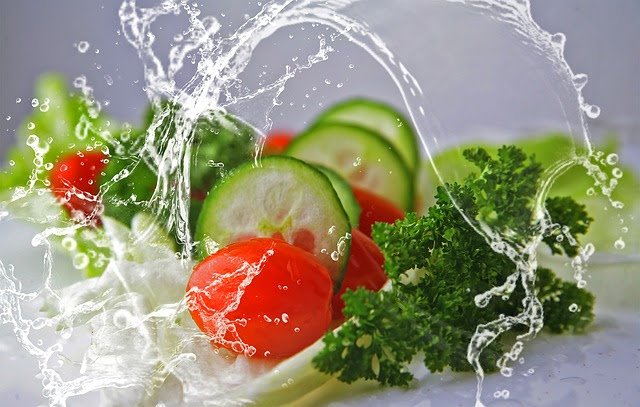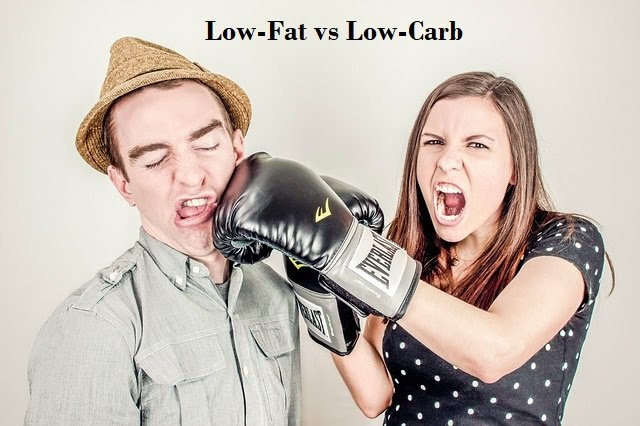Low-carb vs. Low-fat - and the Winner is.....
Which "diet" works the best and for what group of people?
This is the question that has been asked over and over again as Americans and the rest of the world are becoming more obese by the year.
The answer? According to a new study published in JAMA February 20, 2018, is...neither. They both work, although the low-carb group did a little bit better losing 13.2 lbs (6kg) to the low-fat groups 11.7 lbs (5.3kg) - that difference was not enough to reach statistical significance. The study was comprised of about 600 people between the ages of 18-50 with a BMI between 28-40 (normal is 18.5-24.9; overweight 25-29.9; obese 30+) Here is a BMI Calculator if you want to check yours.
The study participants were randomly assigned to either the Healthy Low-fat or the Healthy Low-Carb group. For 12 months they were followed and had regular instructional sessions which taught them about healthy food and lifestyle changes. The study design was quite brilliant in that the end goal was to try and teach the participants how to find a balance in their diet they could sustain as a lifestyle indefinitely.
They called the strategy Limbo-Titrate-Quality. The first step was to "Limbo" or go as low as you can go - asking participants to get their restricted macronutrient (fat or carbs) down to 20 grams per day. As a comparison, the popular ketogenic diet (high fat, moderate protein, low carb) allows for about 25-30 grams of carbs daily. After they sustained this lowered level of carbs or fat for a few weeks the participants could "titrate" those numbers up and see how they fared. The goal was to help them find a level of carbs or fat that they could sustain indefinitely as a lifestyle in order to gain health and lose extra pounds.

This study did a few things differently that bears some investigation. As a part of the study, they looked at the subjects' DNA for 3 different single nucleotide polymorphisms (SNPs). One of the genes coded for increased sensitivity to saturated fats and refined carbohydrates, one was associated with type 2 diabetes and fat metabolism and the other with Metabolic syndrome and obesity. They had expected to find that the subjects with certain genetics would respond to one diet more favorably than to the other. For instance, if the subject had the gene that down-regulated fat metabolism they postulated that the subject would fare better on the low-fat diet. They also looked at how the subjects responded to a glucose challenge and guessed that based on that response those who had a higher insulin response to the glucose (carbohydrates) would fare better on the low-carbohydrate diet.
Interestingly, what they did find is that it really didn't matter about the genetics of the person. What worked for both groups was to improve the quality of the food they were eating and creating a healthy lifestyle including exercise, sleep and thinking about food differently, which they could maintain.
This is the field of epigenetics which none of the review articles seemed to touch on. Yes, you can have certain predispositions based on your genes BUT in many cases, you can control the expression of these genes by manipulating your environment, including the toxins you are exposed to, and manipulating your nutrition through the use of quality, nutrient-rich, toxin-free foods.
This is the first study I've seen where they counseled the participants in both groups about food quality. Counseling the Healthy Low-Carb group to eat grass-fed or pastured animal products, "high quality oils and fats, avocados, hard cheeses, nut butters, and nuts & seeds" and the Healthy Low-Fat group to "choose whole-grain foods (e.g., rather than whole wheat flour products), including steel cut oats, farro, barley, quinoa, brown rice, and wild rice. Healthy Low-Fat participants were also encouraged to explore and consume a wide range of legumes and beans, fresh fruit, low-fat dairy products, and lean meats." (3)
In addition to learning how to choose high quality foods their classes taught them everything a health coach would delve into including meal planning, how to cook vegetables, organic food, eating out, exercise, behavioral changes, food addiction, mindful eating, sleep, maintaining a healthy weight for life, and my personal favorite - freeing yourself from a "diet mentality". There were also psycho-social questionnaires touching on the emotional aspects of eating, including food addictions, depression, self-control, stress and food/eating attitudes. The complete list of the classes/questionnaires can be found here.
In conclusion, what this study shows us is that it's possible to lose weight and regain your health using different methods. Does Low-Carb appeal to you? Great! Low-Fat? Fine! The difference is in adding the HEALTHY word to the front of that moniker. Cut out the refined and processed foods, read your ingredient labels, buy the highest quality food you can afford. Exercise, sleep, de-stress, meditate and exercise. Find the path that works for you. Ditch the diet and gain a lifestyle that works for you to increase your health, slim your waistline and increase your longevity.
References:
Gardner CD, Trepanowski JF, Del Gobbo LC, Hauser ME, Rigdon J, Ioannidis JPA, Desai M, King AC. Effect of Low-Fat vs Low-Carbohydrate Diet on 12-Month Weight Loss in Overweight Adults and the Association With Genotype Pattern or Insulin SecretionThe DIETFITS Randomized Clinical Trial. JAMA. 2018;319(7):667–679. doi:10.1001/jama.2018.0245
Gene information from SNPedia
Other Review Articles of the DIETFITS Trial:
Low-Carb and Low-Fat Diets Battle to a Draw
The Key to Weight Loss Is Diet Quality, Not Quantity, a New Study Finds
Low-fat or low-carb? It's a draw, study finds
Low-fat vs low-carb? Major study concludes: it doesn’t matter for weight loss


I started eating a LCHF diet 2 months ago and I have dropped weight like crazy. I am now it the best shape I may have ever been in my life. The best part is, I'm not hungry and sleepy 2 hours after I eat anymore!
I'm right there with you @jrswab! I love Keto! It makes life so much easier (and healthier!) Have you tried adding in intermittent fasting yet? It's a little tweak that makes a big difference if you reach a plateau you are having trouble breaking through. It's also great because you spend less time planning, cooking and cleaning up <-- all good things for me!
I started intermittent fasting almost 3 years ago actually but only recently got into keto. I'll never stop I.F. I love it way to much and makes is so easy to stay at a healthy weight. I currently do an 18 hour fasting window and eat between 1pm and 7pm or so.
I haven't tried I.F. but I do, do so called 'purge fasts.' I'm starting a three day fast tonight. I try to do it at least a few times a year. I'm more interested in the cancer preventative properties than the weight loss effects since I'm already at a good spot.
I do I.F. with a 36 hour fast weekly. I've done a couple of 3 day fasts. It's funny how much extra time you have on your hands when you're not worrying about eating!
So we are speaking the same language :)
This summarizes what I always tell people. If you want to lose fat just cut out most of the processed stuff. You cut out wheat, sugar, alcohol which are all low in micros and low in saturation. Only when you reach a certain body fat percentage you have to start adjusting your diet and count calories.
I agree with you @noobsin - the most important thing to start with is cleaning up what goes in your mouth bit by bit. I always suggest making one small change at a time - where I see so many people fail is trying to do everything at once (i.e. all the people at the gym Jan 2nd who are gone by the end of the month.) Start with cutting out the soda, move on to the fast-food, then plan to cook more at home, etc. etc. Thanks for the comment!
It is funny really. Avoiding processed foods and sugars, adding lots of vegetables is common to most diets. But people love to argue about carbs and fats. Glad to see a study that brings this more into focus.
I have been reading Robb Wolf's Wired to Eat recently. He comes from the Paleo side of things but what he is promoting in the book is eating lots of veg, avoiding processed food, getting lots of sleep, and doing a little experimentation to see what foods affect you negatively. It has been a really good read so far.
That's been on my to-read list! I traveled through paleo and ended up with keto due to its anti-cancer benefits as well as hunger control. But when I'm not keto I'm definitely Paleo.
Congratulations @tamala! You have completed some achievement on Steemit and have been rewarded with new badge(s) :
Click on any badge to view your own Board of Honor on SteemitBoard.
To support your work, I also upvoted your post!
For more information about SteemitBoard, click here
If you no longer want to receive notifications, reply to this comment with the word
STOPI am not following any special diet, only the vegan one, and trying to avoid gluten and sugar! I think we need to listen to our body to know whats the right diet for each one of us.;)
Congratulations! This post has been upvoted from the communal account, @minnowsupport, by Tamala from the Minnow Support Project. It's a witness project run by aggroed, ausbitbank, teamsteem, theprophet0, someguy123, neoxian, followbtcnews, and netuoso. The goal is to help Steemit grow by supporting Minnows. Please find us at the Peace, Abundance, and Liberty Network (PALnet) Discord Channel. It's a completely public and open space to all members of the Steemit community who voluntarily choose to be there.
If you would like to delegate to the Minnow Support Project you can do so by clicking on the following links: 50SP, 100SP, 250SP, 500SP, 1000SP, 5000SP.
Be sure to leave at least 50SP undelegated on your account.